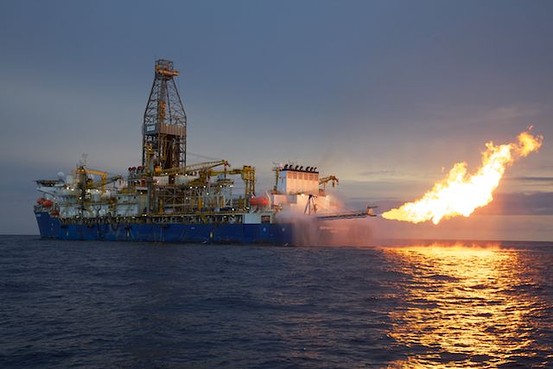Oil explorer warns of fracking’s unintended consequences

An Anadarko vessel flares natural gas off the coast of Mozambique.
By JUSTIN SCHECK and DANIEL GILBERT
CAPE TOWN–While North America’s small oil companies are floating high on the fracking boom, it’s been a tough couple of years for similar-sized companies that focus on more traditional exploration. That’s the kind that involves going to a faraway place and drilling wildcat wells in the hope of striking crude.
Share prices for London-based exploration-and-production companies have dropped 25% since the beginning of 2014, weighed down by a combination of rising exploration costs, a recent dearth of new discoveries, and more frugal oil majors now reluctant to acquire companies or buy assets from smaller explorers.
Such is the setting for this year’s Africa Oil Week. The Cape Town conference is where company and government officials discuss deals over Stellenbosch wine and get ushered from the lobby by marching African drummers into presentations on the business of finding oil in Africa, one of the world’s most prospective regions.
Anadarko Petroleum, among the world’s largest independent exploration and production companies, is one that questions the pessimistic view of exploration. The shale boom may be less sustainable than it seems, argued Frank Patterson, Anadarko’s vice president of international exploration, in a speech on Tuesday.
Patterson noted that unlike conventional drilling which taps a reservoir where oil or gas has collected, fracking taps the source rock where petroleum originates. What’s left after that?
“That’s scary to me as a geologist,” Patterson said.
Investors who have come to value shale drillers’ ability to accurately forecast production may underestimate the risks involved. More than half the shale plays companies have tried to tap have failed, he said.
The shale revolution is storing up a longer term issue for the sector too, Patterson told The Wall Street Journal Wednesday.
Young geologists are learning the manufacturing-like process of drilling lots of shale wells at the expense of learning how to explore for new oil. Patterson called that “potentially a big problem in the future” for exploration companies. Patterson said Anadarko gets around 60% of its production from U.S. shale and similarly dense rock. The company’s African business includes operations in Algeria, Ghana and Mozambique.
The solution, he said, is for companies and their investors to value frontier exploration. That’s been a challenge recently for the companies that specialize in that work.
“We’ve given our shareholders quite a ride,” said Matthew Taylor, the director of exploration for Chariot Oil & Gas.
Shares in the U.K.-listed company, which is exploring Namibia among other places, were were worth just over £3 each in early 2011 but have now plummeted to just 11 pence per share.
Taylor said there’s been some optimism recently. Chariot raised $15 million through a share placing in the summer and has had encouraging talks with other companies about selling a stake in some assets.
Others say they’re similarly hopeful. Tullow Oil, which has seen shares fall 44% this year, has been trying to get partners for some of its assets for months. In recent weeks, it’s been in talks with India’s ONGC Videsh.
ONGC’s exploration chief Anil Bhandari said his company is interested in partnering with Tullow to develop some assets in an arrangement in which his company could wind up with a stake in some fields. But ONGC doesn’t want to buy Tullow itself.
Source: WSJ

